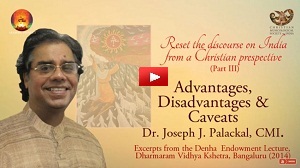
AP 330 to 321
ADVANTAGES AND DISADVANTAGES AS A RESEARCHER : JOSEPH PALACKAL CMI
| Call Number | AP 327C |
| Part Number | Part I - Syro Malabar Church |
| Title | ADVANTAGES AND DISADVANTAGES AS A RESEARCHER : JOSEPH PALACKAL CMI |
| Duration | 1m:29s |
| Place of Recording | Denha Lecture at DVK Bangaluru |
| Date of Recording | 2014 |
| Youtube URL | https://www.youtube.com/watch?v=i9ekdETS05g |
| Video Segment (s) |
|
Notes
DISCOURSE ON INDIA PART III : Advantages and Disadvantages as a Researcher : Excerpts from the Denha Endowment Lecture (2014), Bangaluru by Dr. Joseph J. Palackal, CMI.
My advantages and disadvantages as a researcher: Joseph J. Palackal, CMI.
In reference to the Syriac tradition, I consider myself lucky for several reasons. I happen to belong to what may be characterized as the transitional generation that grew up in Kerala between the 1950s and the 1970s. This was the time of transition of the Syro Malabar liturgy from Syriac to the vernacular. The transitional generation continues to hold memories of the sounds and sentiments of the Syriac language and liturgy.
I also feel lucky to have been born into the family of a great teacher of the Syriac language and liturgy, namely, the saintly Palackal Thoma Malpan (circa 1780-1841), the oldest of the three founding fathers of the religious congregation that I belong to: the Carmelites of Mary Immaculate. I am also lucky to have been born at Pallippuram, the home of the first indigenous seminary (as we understand that term today) of the St. Thomas Christians that Palackal Thoma Malpan founded. It was at Pallippuram Seminary that the Malpan groomed his protégé, his adopted son, Saint Kuriakose Elias Chavara, to be an erudite and zealous priest and future collaborator in founding the first indigenous religious congregation for men in India. Interestingly, the Prior General of this Congregation continues to print its motto in the Syriac language, in the Syriac script, on his official letterhead: Metan ṭennēs lmāryâ ̓alāhâ ḥayltānâ (I Kings 19:10), “I have been very zealous for the Lord Yahweh, the Mighty God.”
At baptism, I was given the name Ouseph, the Kerala adaptation of the Hebrew/Aramaic name, Yawsep. I started active participation in the Syriac liturgy as an altar boy. The liturgical texts were printed in the Malayalam script. Although our generation did not fully understand the meaning of the text, the Syriac melodies were an important part of our religious experience. I made my singing debut in Syriac at the age of nine, with the Syriac chant B’ēda d’yāwmān (“On this festival day”) for the feast of the Assumption of the Blessed Virgin Mary, at my local parish at Pallippuram.
There are a few caveats, however. I am not a scholar of the Syriac language, Syro Malabar liturgy, or Indian church history. My approach to these branches of scholarship has been through music. My authorial voice comes from the knowledge I gained during the researches for my master’s thesis on the singing styles of Puthen Pāna (1995), and my doctoral dissertation on the Syriac chant traditions in South India (2005) at the City University of New York. I needed to situate the melodies and their performance practices in the larger context of the Syro Malabar liturgy. Soon after I completed my doctoral studies, the Syro Malabar Diocese of Chicago asked me, on behalf of the Syro Malabar Synod, to set the English version of Qurbānâ to music. This gave me another opportunity to revisit all that I learned earlier to compose melodies that are appropriate for each segment in the liturgy (Palackal 2007). Twenty-five years of my geographical distance from the Syriac setting in Kerala was a mixed blessing. On the one hand, I was removed from the emotionally laden liturgical controversies that were going on in Kerala. On the other hand, those years also provided me with an intellectual intimacy with the tradition that I am emotionally involved with.
Keywords : #syromalabarchurch #aramaicproject #syriacchants #palackalthomamalpan #palackal #chavara #saintchavara #christianityinindia #indianchristianity #carmelitesofmaryimmaculate #cmi #pallippuram #pallippuramseminary #DVK #thekkanpallippuram #dharmaramvidyakshetra #dharmaram #denha #stthomaschristians #stthomas



